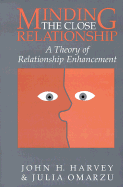Book contents
- Frontmatter
- Contents
- Preface and Acknowledgments
- 1 Introduction to the Minding Concept
- 2 Minding: Definition and Components
- 3 Knowing and Being Known by One's Partner
- 4 Attributions in Close Relationships
- 5 Acceptance, Respect, Reciprocity, and Continuity
- 6 Beginnings and Endings
- 7 Minding in the Close Relationship Literature
- 8 Minding and Other Major Concepts of Closeness
- 9 Evidence about Minding in Close Relationships
- 10 An International Perspective on Minding
- 11 Minding in Couples Therapy and Counseling
- 12 Limitations and Future Directions
- References
- Index
3 - Knowing and Being Known by One's Partner
Published online by Cambridge University Press: 14 September 2009
- Frontmatter
- Contents
- Preface and Acknowledgments
- 1 Introduction to the Minding Concept
- 2 Minding: Definition and Components
- 3 Knowing and Being Known by One's Partner
- 4 Attributions in Close Relationships
- 5 Acceptance, Respect, Reciprocity, and Continuity
- 6 Beginnings and Endings
- 7 Minding in the Close Relationship Literature
- 8 Minding and Other Major Concepts of Closeness
- 9 Evidence about Minding in Close Relationships
- 10 An International Perspective on Minding
- 11 Minding in Couples Therapy and Counseling
- 12 Limitations and Future Directions
- References
- Index
Summary
We are, all of us, molded and remolded by those who have loved us, and though that love may pass, we remain none the less their work – a work that very likely they do not recognize, and which is never exactly what they intended.
François Mauriac, The Desert of LovePerhaps there is no act more endearing than a partner's attempt to diligently, over time, get to know you and use that knowledge toward the enhancement of the relationship. This activity of questing to know another makes that other feel special, treasured, and cared about. Unfortunately, many of us may live out our lives having few if any experiences with others who made us feel this way. The most transcending thesis of this book is that minding offers just such experiences.
Thus, at the heart of the minding process is the quest to know one's partner. At the outset of dating or casual relating, people seek this knowledge about one another for the purpose of determining how close they want to become to new acquaintances, or to gauge whether there is a possibility that they might eventually have the basis for a commitment. When a relationship involves minding, both partners continue to share this quest beyond the initial information gathering; they pursue it vigorously past the point of commitment and throughout the entire span of the relationship.
In this chapter, we discuss why this knowing activity is a key part of minding and how it is carried out.
- Type
- Chapter
- Information
- Minding the Close RelationshipA Theory of Relationship Enhancement, pp. 31 - 60Publisher: Cambridge University PressPrint publication year: 1999



